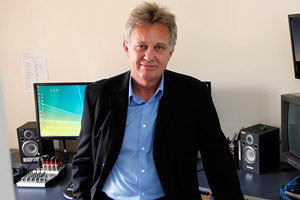Andrew Ogilvie.
Ten Western Australian-based producers have formed Screen Voice, an industry organisation to advocate for production companies that are majority Australian-owned.
One of its aims is to continue to press the case that production companies that are majority or wholly owned by multinationals should not have access to state or federal screen agency investment funds.
While they insist the body has not been set up in opposition to any other screen producers organisations, most notably Screen Producers Australia, the founding chair, Electric Pictures’ Andrew Ogilvie tells IF: “We can offer something that SPA can’t, representing the views of companies that are 50 per cent or more Australian owned.”
Although the initial membership is WA-based and largely represents the documentary community, Ogilvie says Screen Voice welcomes members from other states and from other sectors including drama, animation and Virtual Reality.
Ogilvie was a SPA member but quit several years ago, explaining: “I did not think SPA represented the best interests of production companies that are majority Australian-owned. Many of their members are foreign-owned, which compromises their policies to a degree.”
To be fair, SPA has 500 members, of whom only a handful are foreign-owned, so there is no evidence that such a small cohort has any undue influence on the way SPA represents the screen production sector on such issues as imposing local content obligations on streaming services and the drama and children’s quotas on the free-to-air broadcasters, or the way it negotiates industrial agreements.
The group has been meeting informally for two years but has only just incorporated as an association. The founding members are Artemis Media, Electric Pictures, Prospero Productions, Sandpiper Entertainment, Sea Dog TV International, Blizzard Road Productions, Harry Bardwell Productions, Factor 30 Films and Taylor Media. In addition to Ogilvie the executive includes Julia Redwood, Celia Tait, Ryan Hodgson and Jodie De Barros.
Some Screen Voice members were signatories to a letter to Screen Australia from 38 production companies, producing teams and individual producers which called on the agency to deny funding to BBC Studios’ Australian production arm.
The submission argued that it is unfair for Aussie producers to have to compete for production investment with the BBC, which runs six cable channels in Australia including BBC First and UKTV. Funding a BBC production would knock out a local production company’s application and result in a loss of IP to Australia, it said.
The Screen Australia board rejected the producers’ arguments. “Screen Australia’s view is that competition for its direct funding is to be encouraged as it ensures well developed projects, high-quality applications and promotes the best outcomes for audiences,” chief operating officer Michael Brealey said in a letter to the producers.
Ogilvie has not given up that fight, telling IF: “Federal funding for multinationals’ productions does not happen anywhere else in the world, including Canada. Screen Australia has done and continues to do many good things but investment is falling. We are in hard times.”
Meanwhile Electric Pictures has begun pre-production on the fourth series of Aussie Gold Hunters for Discovery Channels and is about to deliver 100 Days to Victory, a docudrama chronicling the last 100 days of the First World War, commissioned by History Canada, the BBC and Foxtel’s History.


